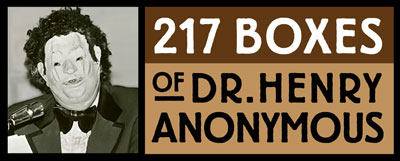John E. Fryer, M.D., Psychiatrist and Dr. H. Anonymous

More Information
- Anonymous No More – John Fryer, Psychiatry, and the Fight for LGBT Equality
- Historical Society of Pennsylvania – The John Fryer Papers
- LGBT History Month – John Fryer
- LGBT History Month – Barbara Gittings
- LGBT History Month – Frank Kameny
- The New York Times – John Fryer Obituary
- Wikipedia – John E. Fryer
- Play Unpacks the Man Behind Mask of Dr. Anonymous
d. February 21, 2003
“I am a homosexual. I am a psychiatrist.”
John E. Fryer, M.D., challenged the designation of homosexuality as a mental illness at the 1972 convention of the American Psychiatric Association (APA). Seated on a panel and disguised as Dr. H. Anonymous, he announced his homosexuality at a time when a medical license could be revoked on that basis. Fryer declared himself a proud member of the APA and explained that homosexuality was not the illness, but rather the toxic effects of homophobia.
Since 1952 the APA had listed homosexuality as a mental disorder in its Diagnostic and Statistical Manual (DSM). Fryer’s actions were pivotal in the declassification of homosexuality as a disease.
The DSM classification was first attacked in the 1960s by Gay Pioneer Frank Kameny, a Harvard-educated Ph.D. astronomer. Kameny and fellow activist Barbara Gittings waged a multi-year campaign against the APA. In 1971 after storming the APA’s annual meeting, they were permitted to organize a panel discussion on homosexuality for the 1972 convention.
When no other gay psychiatrist would participate, Gittings recruited Dr. John Fryer. Concealing his identity with a mask and a voice modulator, he declared, “I am a homosexual. I am a psychiatrist.” He described the hardships homophobia imposed on homosexual psychiatrists and patients. “This is the greatest loss, our honest humanity,” he said, “and that loss leads all those around us to lose that little bit of their humanity as well.” The conventioneers were transfixed. Subsequently, the APA formed a panel to evaluate the basis for the DSM classification. In 1973 homosexuality was delisted as a mental illness.
Fryer earned his medical degree from Vanderbilt University and began his psychiatric residency at the Menninger Foundation in Topeka, Kansas, but grew depressed from hiding his sexual orientation. He relocated to pursue his residency at the University of Pennsylvania, but was forced to leave for being gay. He completed his residency at nearby Norristown State Hospital.
In 1967 Fryer joined the medical faculty at Temple University where he became a professor of psychiatry and family and community medicine. He was employed at Temple at the time of his panel appearance. Having been forced from residency and at least one job for being gay, he took a considerable risk, even disguised. “It had to be said,” he wrote in 1985, “But I couldn’t do it as me. I was not yet full time on the faculty.”
Fryer lived in Philadelphia until his death. In 2006 the APA named an annual civil rights award after him. Barbara Gittings and Frank Kameny were its first recipients.
